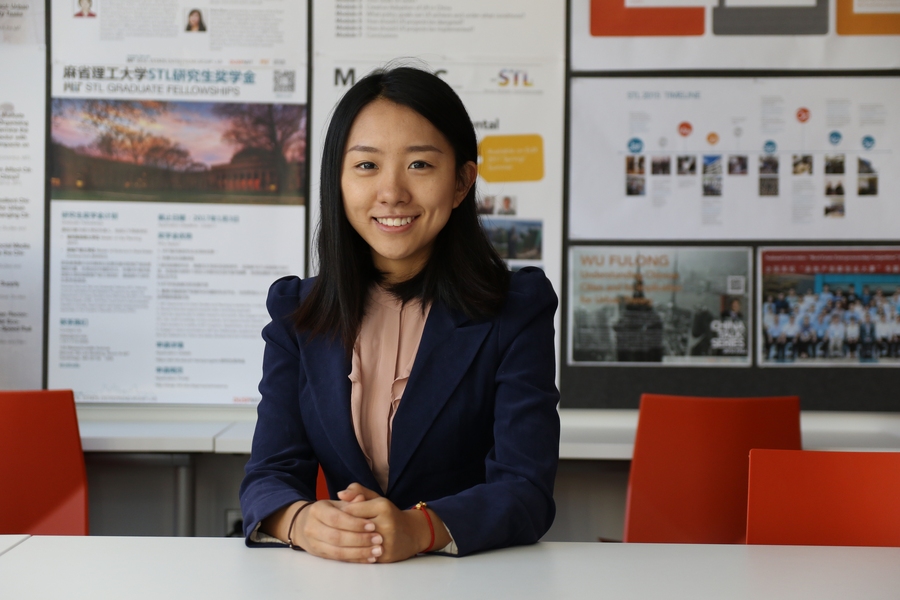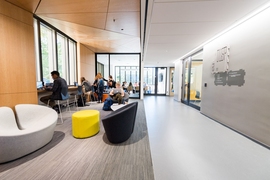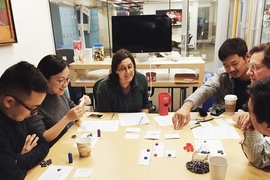Growing up in Inner Mongolia, graduate student Zixiao Yin saw firsthand the effects of poor urban planning. As China underwent record growth, a mining boomtown intended for 1 million people rose from the desert in the neighboring district — but when the economy crashed in 2008, blocks and blocks of empty office buildings and houses created a “ghost city” on the steppe.
The lesson, says Yin, was that sustainability is a critical consideration to balance and control the pace of China’s rapid urbanization. “That’s the first time I got interested in planning,” she says.
Now a graduate fellow in her first semester at the Samuel Tak Lee MIT Real Estate Entrepreneurship Laboratory (STL Lab), Yin is pursuing a master’s in city planning to learn how to help China deal with the enormous challenges in land use that it currently faces.
Thankfully, Yin’s own town of Bayannur was spared much of the real estate boom that wreaked havoc on her province. Growing up, Yin says, she lived in an idyllic environment of watermelon and sunflower fields surrounded by the mountains. Her parents invested early in her education, sending her to the best local schools, and eventually to Beijing’s Tsinghua University, China’s top research university.
Struggling to help the poor
As someone who loved to draw and paint when she was younger, Yin chose to study architecture. She became disillusioned with the field, however, during several school trips to rural China, where the government was working to help develop poor communities. On one visit to the village of Lingqiu in the Shanxi Province, she struggled to adapt what she’d learned in school. “We had learned about how to use different materials in an elegant way to create beautiful buildings, but in a poor village, they don’t have the money to afford that.”
Furthermore, theoretical planning proposals didn’t seem to fit the needs of the local villagers. One plan to build a new public square, for example, seemed to Yin ill-suited for women who tended to gather in front of their homes. “A woman who has to support a family can’t go to a faraway square,” says Yin. “Once you hear a baby crying or another member of the family needing help, you have to run home.”
Another idea to use money to plant border trees along the streets, she says, was met with disbelief. “People in rural China regard trees as a resource, not something for shade or environmental beauty,” she says. “They just thought it was ridiculous.”
Yin began to feel frustrated that the majority of the skills she was learning were focused on creating aesthetic environments for the privileged upper class, not development for the poor people who needed it. “For me it wasn’t rewarding to just serve the rich,” she says.
Facing China’s challenges
Yin had a different experience, however, on a trip to Tiandong, a farming village along the You River in Southwestern China famed for its mangoes. The government had set up the village as one of the pilot villages for rural land transferring. While there, she met several university graduates helping the farmers as entrepreneurs. “The native farmers don’t have the skills to sell their mangoes all over the country, so they had set up a website and developed links all over China,” she says. The head of the village was a recent graduate from Tsinghua, who had worked long hours beside the farmers. “This guy had chosen to come back and serve his rural village,” she says. “It was just very moving.”
After earning her architecture degree, Yin stayed at Tsinghua to study urban planning, researching how policies could help the rural poor. China is currently in the midst of reforming its rural land laws to allow farmers to transfer land-use rights that have been granted by the government. While the measure is expected to help farmers raise capital for agricultural improvements or relocation to cities, some fear it will lead to an epidemic of impoverished, landless peasants. “If you’ve been working hard every day to support your family, and suddenly someone offers you a huge amount of money for your land, it’s hard to refuse,” says Yin. “But in the long term, it’s dangerous. Maybe the money is enough to support someone for three or five years, but after that, they don’t have the ability to get sustainable income.”
Cities are facing their own issues: Urban residents don’t own land, but rather lease it from the government in mostly 70-year leases. As those leases have begun to expire, it has led to national concern about whether leases will be renewed and how much it will cost homeowners to renew their land-use rights.
Gaining an international perspective
Yin plans to examine these kinds of questions at the STL Lab. She first encountered the lab when its staff visited Tsinghua University for a joint project researching criteria for ascertaining socially responsible real estate in China. An STL Graduate Fellowship, focused on students dedicated to sustainable real estate development in China, allowed her to join them at MIT this semester.
“Zixiao embodies our hopes for the fellowship program,” says Yu-Hung Hong, director of the STL Lab. “We want to foster leaders who will use their education in socially responsible real estate development to shape the future of the built environment in China.”
In her first few months in the program, Yin has already gained an international perspective on China’s challenges. “I once thought China was the only country going through a transition of rapid urbanization,” she says, “but now I have found that there are many other countries where this is happening.” In addition to courses, she has learned from the experience of fellow students, some of whom have had experience working with non-governmental organizations in other countries, in rural areas suffering from poverty and war.
In particular, she has thrived on the quality of debate within class. “Sometimes debates make me feel that I really understand the issue. Before issues were framed by my teachers, and this approach was too ‘efficient’,” she says. “I was just told the right answer. At MIT, everything is up for discussion.” One memorable class on imperialism and colonization, she says, featured a soul-searching discussion between descendants from colonizing and colonized countries.
Eventually, Yin hopes to use the knowledge she has gained to tackle some of the more difficult land-use problems affecting her homeland. “I came to MIT is to gain perspectives from outside China to solve problems inside China,” she says. “It’s rewarding for me to think that I can connect my knowledge to what is really happening in my country — not only for the benefit of the rich, but for everyone.”









